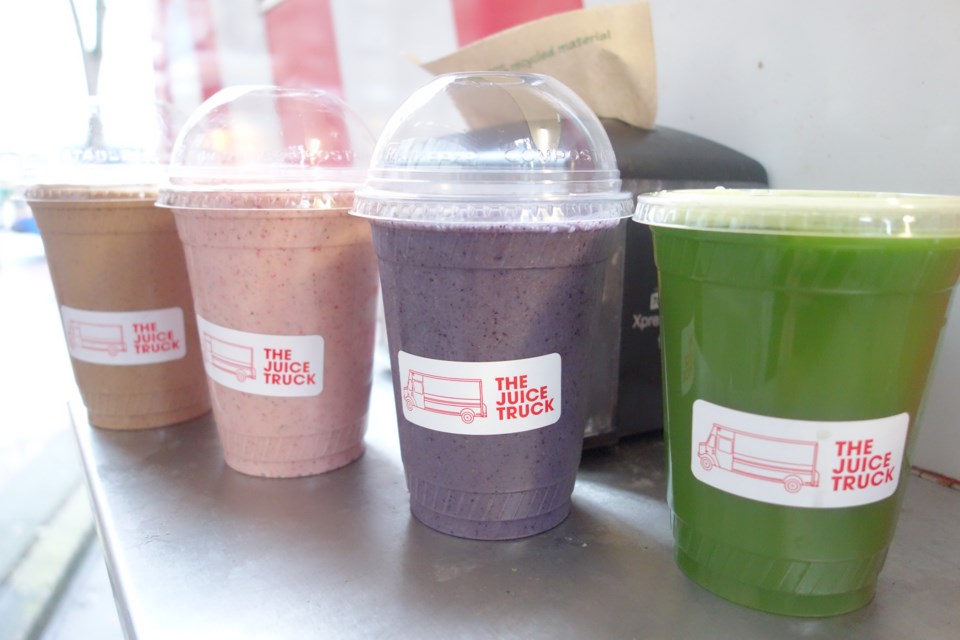To juice, or not to juice?
I’ve never jumped on the juicing bandwagon although I am an amateur “at-home” juicer. I just never saw much point in buying juice when I could do it at home.
Almost any combination of fruits and vegetables is delicious, and you can’t really go wrong from a flavour aspect except if you add too many raw beets (which made me cough uncontrollably and gag). Don’t do it – they’re hard to digest.
I also don’t consider juice or smoothies meal replacements and, at $6+ along side a meal, I don’t see value.
I have never written about this growing “trend” (I dislike the word because detoxification and juicing first came up back in the early 1900s), because I knew little about it.
However, I recently got to ask my million questions at The Juice Truck storefront opening at 28 West 5th.
Many studies and research show why juicing is positive – the added nutrients, enzymes, vitamins, yada yada yada are great for the body, but sugars are often overlooked. Yes, they are natural sugars, but sugar of any kind should be limited if health is priority.
There are increasingly more anti-juicing studies stating the movement can potentially do more harm than good. Just read what the Mayo Clinic has to say.
As mentioned, some juices are full of (natural) sugars, but the body doesn’t separate refined sugars from natural sugars. It metabolizes them the same.
So your pricey beet, carrot, and apple juice can have the same sugar content as your can of pop.
Juicing also takes out a lot of fibre, which a majority of people don’t get enough of anyway. Eating the whole vegetable or fruit will always be better than juicing or blending it, but the convenience of getting the volume of nutrients from a variety of produce all at once is where juice and smoothies have value.
Multi-vitamins are always another option, but, again, whole foods are ideal.
The juicer is also a key component. For professional use, many stand by the Norwalk (the juicer, not the virus) at $2,500, or the Hurom or Omega juicers – both more for home use at around $350.
The machines are not a small investment, but they all offer slow-speed technology, which optimizes and preserves the nutrients being juiced. It might sound like a bunch of marketing “hoopla”, but the science is hard to argue.
Speaking of science, it’s also true that the more fruits and vegetables oxidize, the more nutrients are lost, so even bottled juices should be consumed immediately and filled to the very top so juice is not exposed to air. Any pre-made juice left sitting out should probably stay sitting.
High-speed juicers and blenders rip through cell walls, destroying nutrients, and also incorporate a lot of air, which causes more nutrient loss. So if you’re going to invest in juice, use the right juicer or purchase from retailers using proper equipment.
The Juice Truck and The Green Moustache in Whistler are two local juicers using the Norwalk, but there are possibly others I’m unaware of.
It’s not only the machine though; the quality of ingredients also plays a role.
It’s undeniable that fruits and vegetables start to lose their nutrients as soon as they are harvested and handled, so the freshness of the produce, and whether it is prewashed and precut, is important. Then you should think about sourcing them locally and organically.
I suggest purchasing juice from stores with high volume so there is high production and turnover in inventory.
If juicing at home, I recommend purchasing at the farmer’s markets where local produce isn’t being trucked from very far before it gets in your hands.
There are many pros and cons to juicing and it’s challenging to get everything right. There’s no scientific proof juicing can cure diseases or ensure healthy weight loss, but it’s not “bad” for you either if you’re conscious of what you’re doing and buying.
I’ve only tried The Juice Truck, the first mobile juice company in BC and arguably in Canada, but there are now more than 15 juice companies in BC.
While I can’t speak to their juice cleanse (something you should consult with your doctor about before trying), when it comes to grabbing a juice to go, Juice Truck founders Zack and Ryan have worked with nutritionists to develop their business and have set a good benchmark for the local juicing industry.
Find Mijune at the Summer Wheat Harvest Festival and Rustichella d'Abruzzo pasta’s 90th anniversary in Abruzzo, Italy along with La Grotta Del Formaggio’s Corporate Chef, Alex Tung. Follow their adventures at #RustichellaPasta and #FMFinAbruzzo.
Find out more about Mijune at FollowMeFoodie.com or follow her on Twitter and Instagram @followmefoodie.



